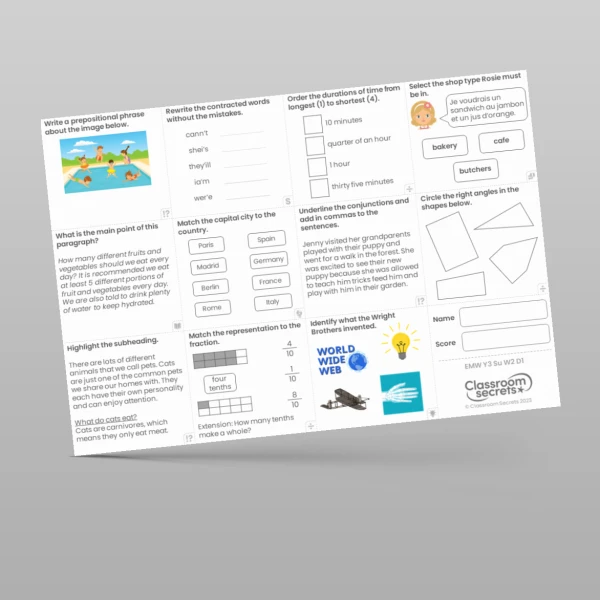

Make sure children are where you expect them to be, or fill in gaps in their learning with this KS2 Identifying Clauses and Phrases Test Practice. The questions give children a sentence with phrases or clauses underlined and asks them to identify how it is used in the sentence. The questions are differentiated four ways to make it easier for you to pitch them at the right level for your children. Answers are included to take some of the pressure off your marking. Use in class, as an intervention or send out as homework.
Differentiation:
Beginner Identify whether the underlined phrase is a noun phrase or a preposition phrase. Aimed at Year 2 Mastery/Year 3 Developing.
Easy Identify whether the underlined phrase/clause is a noun phrase, a main clause or a preposition phrase. Aimed at Year 3 Secure.
Tricky Identify whether the underlined phrase/clause is a noun phrase, a preposition phrase, a main clause or a relative clause. Aimed at Year 5 Secure.
Expert Identify whether the underlined phrase/clause is a noun phrase, a preposition phrase, a main clause or a relative clause. Sentences are complex with ambiguous words and phrases. Aimed at Year 5 Mastery.
Curriculum Objectives
- Learn how to use: Expanded noun phrases to describe and specify [for example, the blue butterfly] / Expanded noun phrases for description and specification [for example, the blue butterfly, plain flour, the man in the moon] / Terminology for pupils: noun phrase
- Develop their understanding of the concepts set out in English appendix 2 by: Using conjunctions to express time and cause / Express time, place and cause using conjunctions [for example, when, before, after, while, so, because] / Terminology for pupils: conjunction
- Develop their understanding of the concepts set out in English appendix 2 by: Using relative clauses beginning with who, which, where, when, whose, that or with an implied (ie omitted) relative pronoun / Relative clauses beginning with who, which, where, when, whose, that, or an omitted relative pronoun / Terminology for pupils: relative clause
Tags
Sentences
Test Practice
2G3.2
3G1.4
5G3.1a
Year 3 Test Practice
Year 4 Test Practice
Year 5 Test Practice
Year 6 Test Practice
Year 6 SATs Preparation











